General
performance
As usual, we used Bapco SYSmark 2012 suite
to estimate the processor performance in common-purpose tasks. It emulated the
usage models in popular office, designed digital content and processed
applications. The idea behind this test is pretty simple: it produces a single
score describing the average computer performance, after the release of Windows
8 SYSmark 2012 was updated to version 1.5, and this is exactly the version we were
using in our test session.
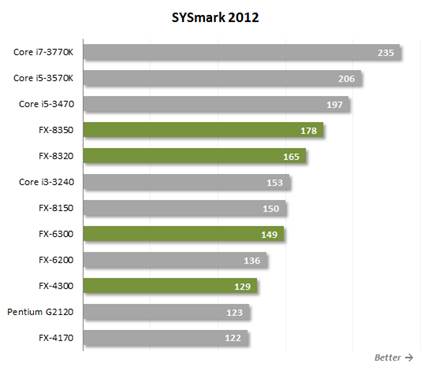
FX-8350
is 19% more effective than FX-8150
Compared with many predecessors, Vishera
processors make good progress. FX-8350 outperformed FX-8150 by 19%, thanks to
its higher clock frequency. Though, you shouldn’t underestimate the new
microarchitecture’s contribution. Even FX-8320 with slightly lower clock speed
than from the top Zambezi processor, is not any slower: FX-8320 is 10% faster
than FX-8150. We almost saw the same results among the six-core AMD processors
from different generations: FX-6300 and FX-6200. However, the quad-core FX-4300
is only 6% ahead of the FX-4170, because the old quad-core Bulldozer processor
works at a relatively high clock frequency, and also owns a full-size 8 MB L3
cache, unlike its successor.
But, the success of the new AMD processors,
which was so obvious when we compared the models from two different
generations, doesn’t change the bigger image including competitors from Intel.
Eight-core FX CPUs are still weaker than quad-core Ivy Bridge processors, meanwhile
six-core and quad-core AMD processors can only fight against Core i3 or
Pentium.
Now, take a closer look at the SYSmark 2012
performance scores which were created in different usage cases. Office
Productivity case emulated typical office tasks, such as text editing,
electronic tables dealing, email and Internet browsing. This case used these
apps: ABBYY FineReader Pro 10.0, Adobe Acrobat Pro 9, Adobe Flash Player 10.1,
Microsoft Excel 2010, Microsoft Internet Explorer 9, Microsoft Outlook 2010,
Microsoft PowerPoint 2010, Microsoft Word 2010 and WinZip Pro 14.5.
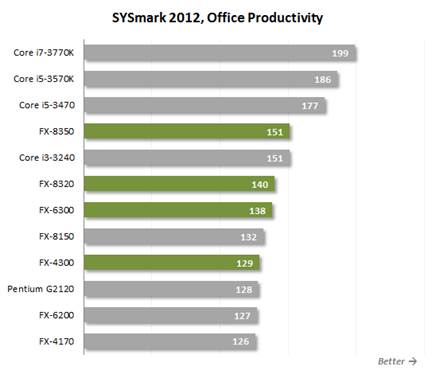
Office
Productivity
Media Creation case emulated the making of
a video clip using early taken digital images and videos. Here they used the common
Adobe suite: Photoshop CS5 Extended, Premiere Pro CS5 and After Effects CS5.
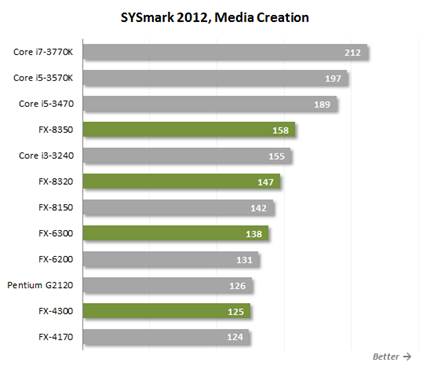
Media
Creation
Web Development is a case emulating
web-site designing. It used the following apps: Adobe Photoshop CS5 Extended,
Adobe Premiere Pro CS5, Adobe Dreamweaver CS5, Mozilla Firefox 3.6.8 and
Microsoft Internet Explorer 9.

Web
development
Data/Financial Analysis case was for analyzing
and predicting market trends performed in Microsoft Excel 2010.
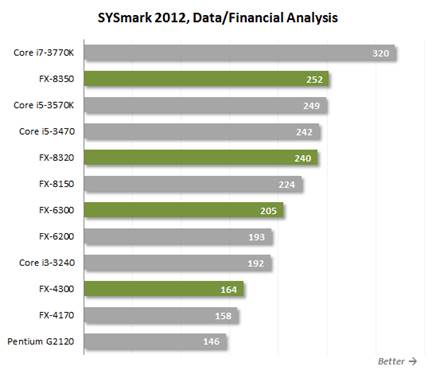
Data/Financial
Analysis
3D Modeling case was specific for 3D
objects and rendering of static and dynamic scenes by using Adobe Photoshop CS5
Extended, Autodesk 3ds Max 2011, Autodesk AutoCAD 2011 and Google SketchUp Pro
8.

3D
Modeling
The last case named System Management
created backups and installed software plus updates. It consisted of some
different versions of Mozilla Firefox Installer and WinZip Pro 14.5.
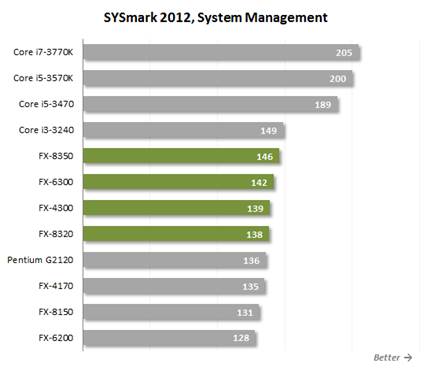
System
Management
Although the overall score can make Vishera
processors seem not fast enough, there were popular situations in which some of
them did really well. Contemporary AMD microarchitectures are pretty weak when
it loads few threads, because their performance-per-core, in the end, turns out
not high enough. Though, when we deal with multi-threaded loads, they can
really shine since they have more physical cores than Intel’s suggestions.
Some interesting examples of situations in
which the FX series processors do really well are 3D modeling tasks or
financial calculations. Here, eight-core FX-8350 and FX-8320 performed as well
as the quad-core Core i5 processors and sometimes even better than them.
However, those models with fewer cores can’t boast about the same success. Even
in the most advantageous testing conditions, six-core and quad-core AMD Vishera
processors could only reach the level of the Intel Core i3.
Game
Performance
As you know, the graphics subsystem mostly
determines the performance of the entire platform equipped with fairly hi-speed
processors in most of current games. Thus, we selected the most CPU-reliant
games and took the fps readings twice. The first test was run without
antialiasing and too far not the highest screen resolutions. These settings
allowed us to define how well the processors could generally deal with the
gaming loads and how tested CPUs would behave in the near future, when new fastest
graphics card models will be widely available. The second test was carried out
with more real-life settings – in FullHD resolution and maximum FSAA settings. Personally,
these results were less interesting, yet they demonstrated clearly the performance
level we can expect from today’s processors.

Batman
Arkham City
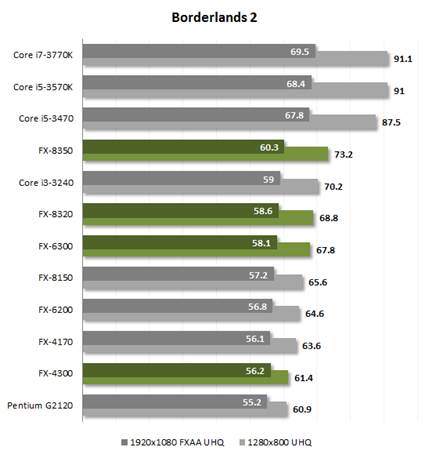
Borderlands
2

Crysis
2
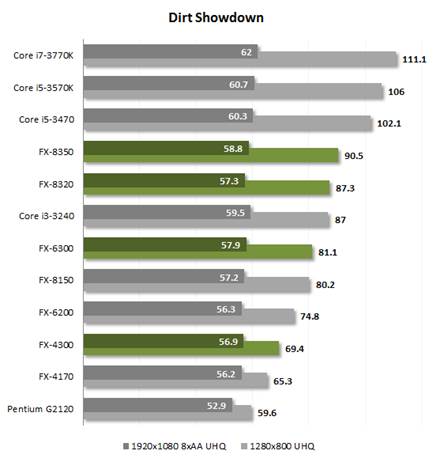
Dirt
Showdown

Far
Cry 2
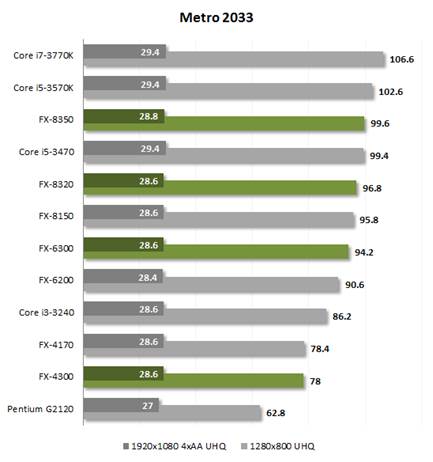
Metro
2033
Bulldozer microarchitecture didn’t run well
in games. Fortunately, its recent update, Piledriver, started to show
improvements in this aspect. Vishera has become remarkably faster in games than
Zambezi. Therefore, FX-8150 was completely defeated not only by the new
generation eight-core processors, FX-8350 and FX-8320, but also by the six-core
FX-6300. Though, the FX-4300’s gaming performance turned out somewhat
disappointing. Unluckily, AMD decided to reduce its L3 cache memory size,
because at present its new generation FX CPU loses even to its predecessor,
FX-4170, in games that are crucial to the memory sub-system performance.
However, regarding the enhancement of
gaming capabilities in the new Vishera processors with eight and six computing
cores, it is essential to bear in mind that Intel CPUs continue dominating the game
segment with considerably higher speeds. Core i7 and Core i5 based platforms
produce more fps than systems with the top AMD FX processors plus Core i3 CPUs is
able to challenge FX-6300 easily.
It means that AMD fans that enjoy 3D gaming
unregularly can only be keen on the fact that the actual gaming performance is
limited by the potential of graphics sub-system, which doesn’t allow the CPUs to
shine totally. Therefore, in real-life situation, the difference between faster
and slower processors may be difficultly recognizable. Though, it is a pretty
weak argument. As we can see from the test results, there are games in which
the processor performance didn’t affect the fps rate even with maximum image
quality. Additionally, in new 3D shooters coming out these days, we know
nothing about the effects of CPU performance on the graphics sub-system.